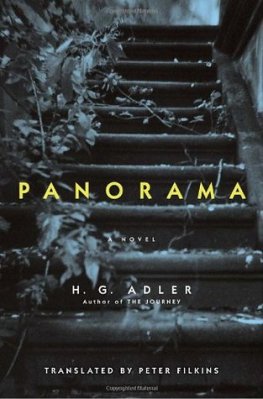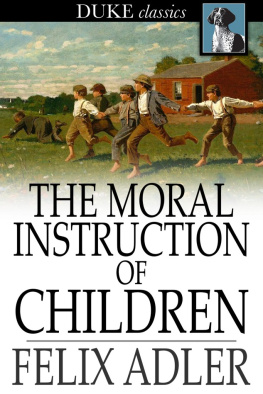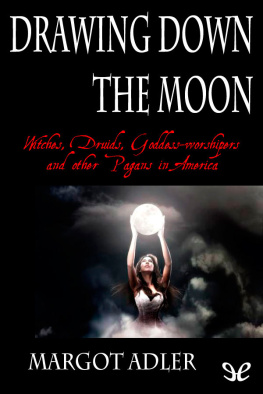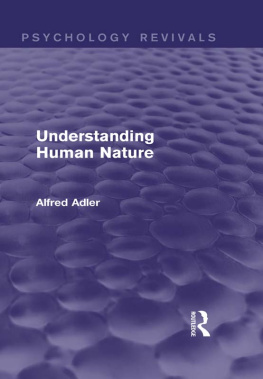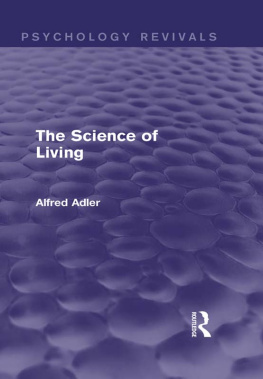H. G. Adler - Panorama
Here you can read online H. G. Adler - Panorama full text of the book (entire story) in english for free. Download pdf and epub, get meaning, cover and reviews about this ebook. year: 2011, publisher: Random House, genre: Detective and thriller. Description of the work, (preface) as well as reviews are available. Best literature library LitArk.com created for fans of good reading and offers a wide selection of genres:
Romance novel
Science fiction
Adventure
Detective
Science
History
Home and family
Prose
Art
Politics
Computer
Non-fiction
Religion
Business
Children
Humor
Choose a favorite category and find really read worthwhile books. Enjoy immersion in the world of imagination, feel the emotions of the characters or learn something new for yourself, make an fascinating discovery.

- Book:Panorama
- Author:
- Publisher:Random House
- Genre:
- Year:2011
- Rating:5 / 5
- Favourites:Add to favourites
- Your mark:
- 100
- 1
- 2
- 3
- 4
- 5
Panorama: summary, description and annotation
We offer to read an annotation, description, summary or preface (depends on what the author of the book "Panorama" wrote himself). If you haven't found the necessary information about the book — write in the comments, we will try to find it.
Panorama — read online for free the complete book (whole text) full work
Below is the text of the book, divided by pages. System saving the place of the last page read, allows you to conveniently read the book "Panorama" online for free, without having to search again every time where you left off. Put a bookmark, and you can go to the page where you finished reading at any time.
Font size:
Interval:
Bookmark:
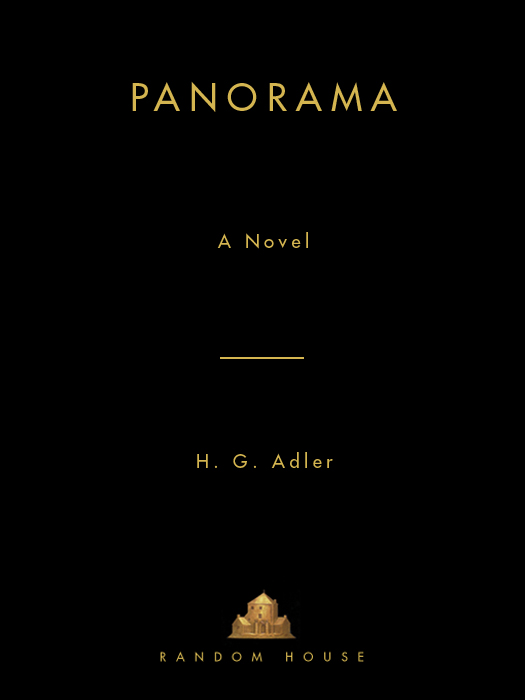
ALSO BY H. G. ADLER
The Journey
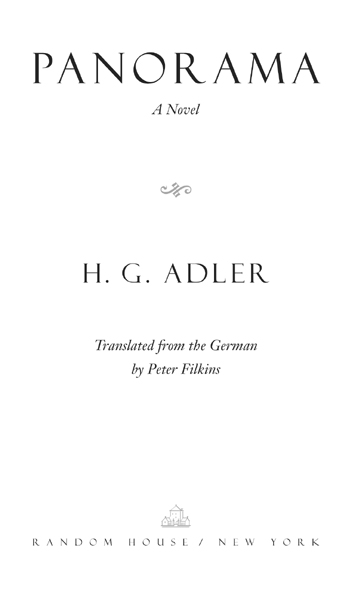
Panorama is a work of fiction. Names, characters, places, and incidents are the products of the authors imagination or are used fictitiously. Any resemblance to actual events, locales, or persons, living or dead, is entirely coincidental.
Translation and introduction copyright 2011 by Peter Filkins
All rights reserved.
Published in the United States by Random House, an imprint of The Random House
Publishing Group, a division of Random House, Inc., New York.
R ANDOM H OUSE and colophon are registered trademarks of Random House, Inc.
This work, excluding the afterword, was originally published in Germany as Panorama by Walter-Verlag in 1968 and by Paul Zsolnay Verlag in 2010. Copyright 2010 by Paul Zsolnay Verlag, Vienna. This edition published by arrangement with Paul Zsolnay Verlag.
Grateful acknowledgment is made to Zephyr Press for permission to reprint an excerpt from Bohemia Lies by the Sea from Darkness Spoken: The Collected Poems of Ingeborg Bachmann, copyright 2000 by Piper Verlag GmbH, Munchen. English translation copyright 2006 by Peter Filkins. Reprinted by permission of Zephyr Press, www.zephyrpress.org.
The afterword by Peter Demetz was originally published, in the German language, in Panorama by H. G. Adler by Piper Verlag in 1988 and is reprinted here, in translation, by permission of the author. Copyright 1988 by Peter Demetz.
LIBRARY OF CONGRESS CATALOGING-IN-PUBLICATION DATA
Adler, H. G.
[Panorama. English]
Panorama : a novel / H.G. Adler ; translated from German by Peter Filkins.
p. cm.
eISBN: 978-0-307-79446-8
1. JewsCzech RepublicFiction. 2. Prague (Czech Republic)Fiction. 3. Bohemia (Czech Republic)Fiction. 4. Holocaust, Jewish (19391945)Czech RepublicFiction. I. Filkins, Peter. II. Title.
PT2601.D614P313 2010
833.914dc22 2010015079
www.atrandom.com
v3.1


T HE G ERMAN TEXT FOR THE NOVEL IS TAKEN FROM THE 1968 FIRST EDITION of Panorama published by Walter-Verlag, which was awarded the Charles Veillon Prize the following year.
I am deeply grateful to the American Academy in Berlin for a Berlin Prize Fellowship, which was key to my initial work on Adler while translating his second novel, The Journey, Panorama being his first. Particular thanks goes to my colleague Chris Callanan for his immensely resourceful knowledge of German, and for his willingness to respond to and debate numerous questions on the text. I am also grateful to Jeremy Adler for his many patient replies to questions, to Philip Bohlman for his support and friendship, and to Peter Demetz for granting permission to reprint his excellent afterword. As ever, Susan Roeper has been there throughout, helping me to think through so many choices, while my editor at Random House, Paul Taunton, remains a guiding intelligence to this day.

I still border on a word and on another land,
I border, like little else, on everything more and more,
A Bohemian, a wandering minstrel, who has nothing, who
Is held by nothing, gifted only at seeing, by a doubtful sea, the land of my choice.
I NGEBORG B ACHMANN
Bohemia Lies by the Sea
W HEN H. G. A DLER RETURNED TO P RAGUE IN J UNE OF 1945, HE CARRIED within him the remains of a time and place that was no more, and that would never exist again. Exhausted, nearly dead from the two months trek back from the Langenstein camp outside Buchenwald, where he had been liberated by American troops in April, Adler returned to Prague by way of Theresienstadt, retrieving from Leo Baeck the voluminous notes he had taken during his two and a half years there. A decade later, these would become his monumental study Theresienstadt 19411945, his first significant publication, earning him the Leo Baeck Prize and early, yet fleeting acclaim. In that same ten-year period, however, Adler also wrote five novels, the first of which, Panorama, was produced in 1948, in the white heat of a survivors fervor, Adler having moved to London and permanent exile the year before.
Panorama is Adlers elegy to a world that was no more. Pastoral, even comic in its rendering of the Prague and the Bohemia in which Adler grew up after World War I, it harks back to the past not out of mere nostalgia but, rather, to show how even amid the innocence of childhood and a world steeped in a history and a tradition that could be traced to the Romans, the seeds of its own destruction were planted, resting invisible and unknown beneath the surface but destined to blossom in the full terror and violence that would wipe out not only a people but also a language and a culture that had produced the likes of Franz Kafka and so much more.
For what is perhaps most important to appreciate about Adler and Panorama is that in many ways it is the culminating product of what is known as the Prague Circle of German letters, a distinct milieu whose writers and audience were primarily German-speaking Jews of the Hapsburg Empire, and who considered themselves citizens of that empire until its dissolution in 1918, their primary identification resting with the ancient kingdom of Bohemia throughout. After that came the formulation of Czechoslovakia, though even then Bohemia remained its largest and most populated region. Hitlers annexation of the Sudetenland in 1938 marked the first time that Bohemias territory had been divided in nearly a thousand years. As we know, this annexation also set off the cataclysm that extinguished not only the writers of the Prague Circle but also their readers, not to mention every trace of the German language from the streets of Kafkas Prague. Born there in 1910, Adler was at the tail end of the generation that could count Kafka as its immediate ancestor and whose literary style had been shaped by him and by the distinct sentence structure and diction that were native to the Prague Circle.
It requires no great leap, then, to see that Josef Kramer, whose life is depicted in Panorama, and whose biography mirrors Adlers, is a clear manifestation of that other Josef K. of certain renown. Indeed, whereas Kafkas object is largely to illuminate the nightmarish unreality of the everyday world that Josef K. finds himself trapped within, Adlers is to create a mirror image of that world, in which he explores the everyday nature of the nightmare that he himself came to experience and to survive. At the start of the novel, the reader has no idea that Josef will end up in the Langenstein camp, or that, like Adler, he will end the book as an exile in England who cannot look forward without looking back. But the unknowable nature of such events is very much to the point, for neither could the young Adler, or the culture that bore him, see it coming. From the first page of The Trial, we know that Josef K. has woken to a world that will probably not allow him to survive. At the start of Panorama, however, we are immersed in the everyday charms of a milieu that, from the point of view of Josef Kramer, looking back through the panorama of his experience and memory, is all the more poignant for its unanticipated, yet inescapable, demise.
Font size:
Interval:
Bookmark:
Similar books «Panorama»
Look at similar books to Panorama. We have selected literature similar in name and meaning in the hope of providing readers with more options to find new, interesting, not yet read works.
Discussion, reviews of the book Panorama and just readers' own opinions. Leave your comments, write what you think about the work, its meaning or the main characters. Specify what exactly you liked and what you didn't like, and why you think so.

